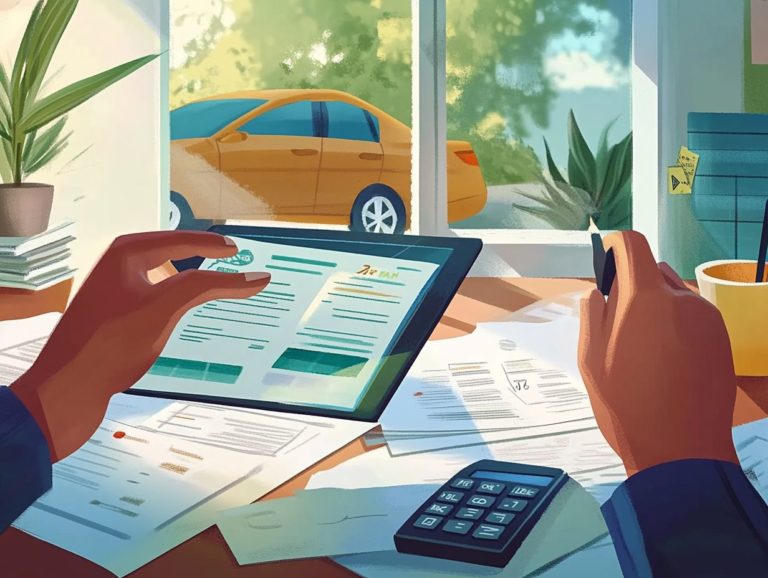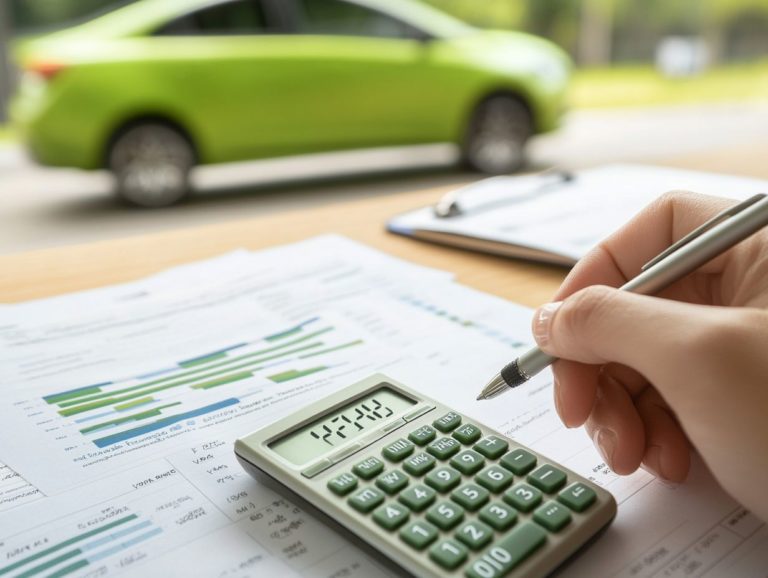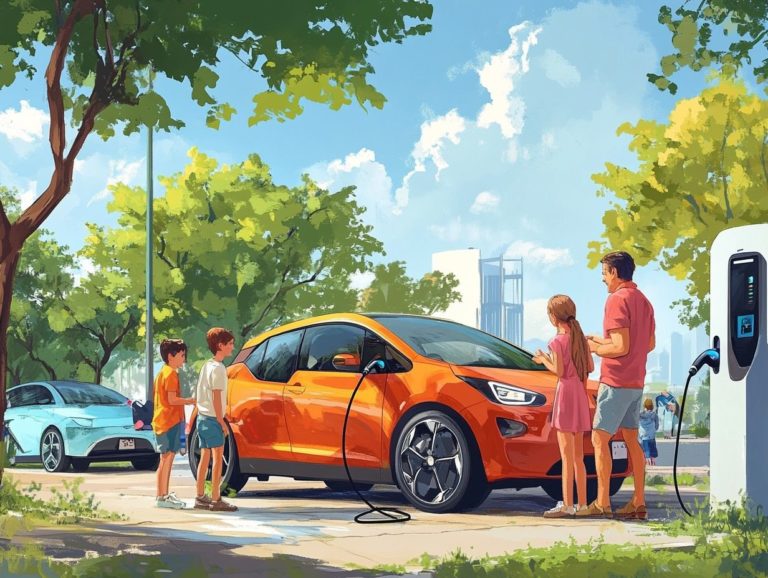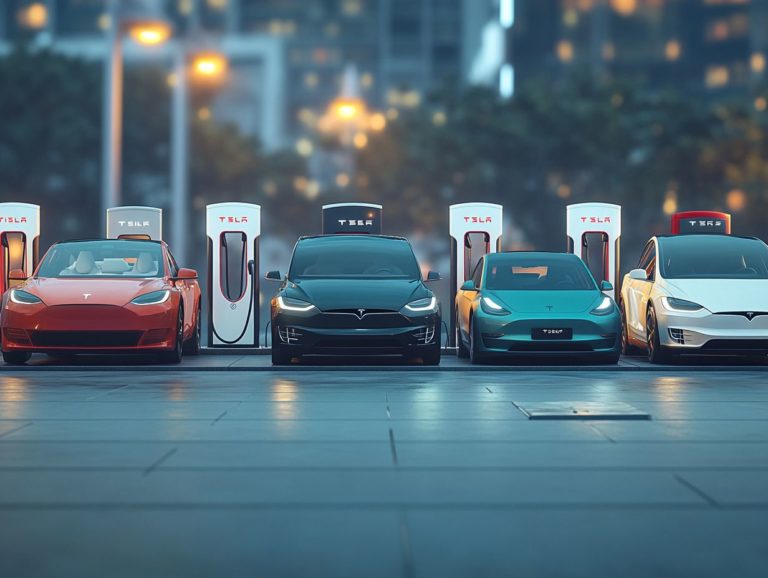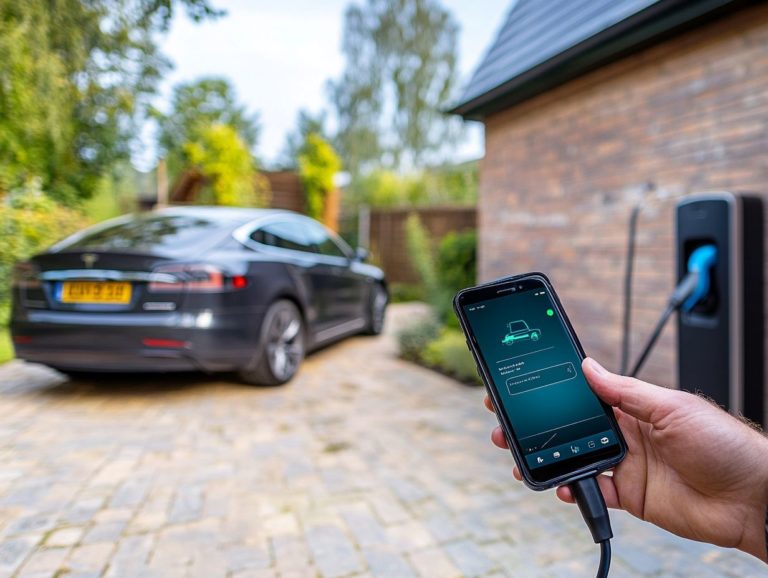A Guide to EV Resale Options
Electric vehicles (EVs) are gaining traction, not just for their environmental perks but also for their impressive potential resale value.
As you contemplate making the switch to electric, grasping the ins and outs of effectively reselling your EV becomes crucial.
This guide will walk you through everything from the factors that impact resale value to the best avenues for selling whether that s through private sales, trade-ins, or dealerships.
Get ready to discover thrilling tips that will prep your EV for resale and attract eager buyers!
Dive in to learn how to maximize the value of your electric vehicle when it s time to hand over the keys.
Contents
- Key Takeaways:
- Understanding Electric Vehicles (EVs)
- Factors Affecting EV Resale Value
- Options for Reselling Your EV
- Preparing Your EV for Resale
- Resources for Finding EV Buyers
- Finalizing the Sale of Your EV
- Frequently Asked Questions
- 1. What is EV Resale and why is it important?
- 2. What are my options for reselling my EV?
- 3. What factors should I consider when choosing a resale option?
- 4. How can I ensure I get the best price for my EV?
- 5. Are there any tax implications for reselling my EV?
- 6. Can I lease an EV and still have resale options?
Key Takeaways:

- Consider resale value when purchasing an EV. Factors such as battery health and technology advancements can impact its worth.
- Explore all options for selling your EV, including private sale, trade-in, and dealership. Each has its pros and cons, so choose the best fit for you.
- Maximize resale value by properly maintaining your EV and highlighting its unique features. Utilize online marketplaces and resources to find potential buyers.
Understanding Electric Vehicles (EVs)
Understanding electric vehicles (EVs) involves exploring several key aspects, including their various types and benefits. There s a growing interest in these eco-friendly options.
As the automotive industry pivots towards sustainability, the used EV market is flourishing. This presents you with a wealth of choices from plug-in hybrids (PHEVs) to battery electric vehicles (BEVs) like the Nissan LEAF and MG ZS EV.
With the rise of charging infrastructure and available incentives, such as the IRS Clean Vehicle Tax Credit, it s essential for you to grasp the dynamics of this rapidly evolving sector.
Overview of EVs and Their Benefits
Electric vehicles (EVs) are reshaping the automotive landscape, offering a multitude of advantages that resonate with environmentally-conscious individuals and budget-minded drivers alike.
These vehicles not only deliver significant fuel savings, which helps you reduce daily transportation costs, but they also come with attractive tax credits that can substantially lower the overall purchase price.
Beyond the financial perks, EVs generally require less maintenance due to their fewer moving parts compared to traditional gasoline engines. This means less wear and tear for you.
With advancements in battery health and performance, you can expect longer lifespans and improved efficiency, tackling common concerns head-on.
As the community of eco-conscious vehicle enthusiasts continues to grow, your collective efforts in advocating for EV adoption play a crucial role in propelling sustainable practices forward.
Factors Affecting EV Resale Value
The resale value of electric vehicles (EVs) hinges on a variety of factors, such as battery health, depreciation rates, and the thorough vehicle history presented during the sale process. It s essential for you to grasp these dynamics to maximize your selling potential.
Understanding these elements empowers you to make informed decisions that can significantly impact the value of your EV.
Key Considerations for Resale Value
When you re evaluating the resale value of a used EV, several key factors come into play, including the vehicle’s performance and the remaining battery warranty.
You ll want to keep an eye on the vehicle’s battery health, as it significantly affects both range and longevity. A well-documented maintenance history is equally important; having a solid servicing record will reassure potential buyers about the vehicle’s reliability.
Financial predictability also matters, as consumers are more inclined to invest in EVs that promise not only savings on fuel but also a robust resale value.
Your driving habits can also influence market expectations, as those who prioritize efficient usage tend to seek out vehicles with lower depreciation rates.
Ready to maximize your EV’s resale value? Let’s get started!
Options for Reselling Your EV

When it’s time for you to resell your EV, you have a range of options at your disposal. You can choose a private sale, enjoy the convenience of a trade-in at a dealership, or explore specialized platforms designed for used EV transactions. To make an informed decision, consider reading our guide on how to choose between EV models.
Each approach has its own advantages and disadvantages, allowing you to pick one that best aligns with your goals.
Private Sale vs. Trade-In vs. Dealership
Choosing the right method to sell your electric vehicle requires careful consideration. Weigh the benefits of a private sale against the convenience offered by trade-ins and dealership offers.
Understanding these nuances can significantly influence your vehicle’s resale value. A private sale might yield higher returns, especially in a flourishing market where buyers are eager for eco-friendly options. However, this route demands time and effort, as you’ll need to handle negotiations and marketing.
Trade-ins offer a more streamlined experience. Dealerships evaluate your electric vehicle’s condition and market demand to provide a fair offer. While trade-in values might be lower especially in crowded markets you’ll appreciate the immediacy and reduced hassle of the process.
Your decision depends on what matters most to you maximizing profit or ensuring a swift transaction.
Preparing Your EV for Resale
Preparing your electric vehicle for resale is essential for maximizing its value. This process includes checking the vehicle thoroughly, maintaining an up-to-date maintenance schedule, and ensuring a comprehensive vehicle inspection.
By attending to these details, you set the stage for a successful resale experience.
Tips for Maximizing Resale Value
To maximize the resale value of your electric vehicle, consider implementing a few effective strategies. Start with a thorough quality check and verify that your battery warranty remains in good standing.
Maintaining a detailed log of your service history is essential. It shows prospective buyers that the vehicle has been well cared for, which they often appreciate.
Addressing minor repairs promptly can prevent larger issues later, preserving performance and integrity. Accurately documenting all specifications such as battery life, charging details, and upgrades can enhance your vehicle’s appeal.
Presenting a well-maintained vehicle not only shows reliability but also showcases your diligence as an owner, making it more attractive to buyers who are likely to pay a premium for that added peace of mind.
Resources for Finding EV Buyers
Use various resources to find potential buyers for your used electric vehicle. Explore online marketplaces and platforms that cater specifically to the EV community to connect with interested buyers effectively.
Online Marketplaces and Other Options

Online marketplaces have become critical for selling used EVs, offering a range of pricing options while connecting you to the vibrant EV community.
These platforms simplify selling, help you compare prices, and make negotiation easy. The convenience of online listings enables you to reach a wider audience swiftly, sidestepping the limitations of traditional methods that restrict exposure to local buyers.
In this dynamic EV community, recommendations and referrals are vital. Satisfied customers are likely to share their experiences, leading to quicker sales and fostering trust among potential buyers.
By leveraging these online resources, you connect with like-minded enthusiasts, nurturing not only sales but also a rich sense of community surrounding electric vehicles.
Finalizing the Sale of Your EV
Finalizing the sale of your electric vehicle entails several crucial steps. You’ll need to navigate legal considerations and understand financial predictability to guarantee a seamless transaction.
Follow these steps for a successful sale and enjoy your next adventure!
Legal and Financial Considerations
When you re selling your electric vehicle, it s essential to pay attention to the legal and financial elements that can influence both the resale value and the overall transaction process.
Understanding the legal requirements is vital. For example, title transfer is essential to avoid problems during the sale. Typically, this means obtaining the title from the current owner, which must be clearly signed over to you, the buyer.
You should also be aware of any state-specific regulations regarding emissions and inspections that might apply.
On the financial side, selling an electric vehicle presents distinct advantages. These include potential tax benefits and government incentives that make your car more appealing to buyers. This can lead to greater financial predictability and enhance resale value, making the transaction advantageous for everyone involved.
Frequently Asked Questions
1. What is EV Resale and why is it important?
EV resale refers to the process of selling your electric vehicle to a new owner. It is important because it allows EV owners to recoup some of their investment, make room for a newer model, and help reduce carbon emissions by keeping the EV in use instead of sitting unused.
2. What are my options for reselling my EV?
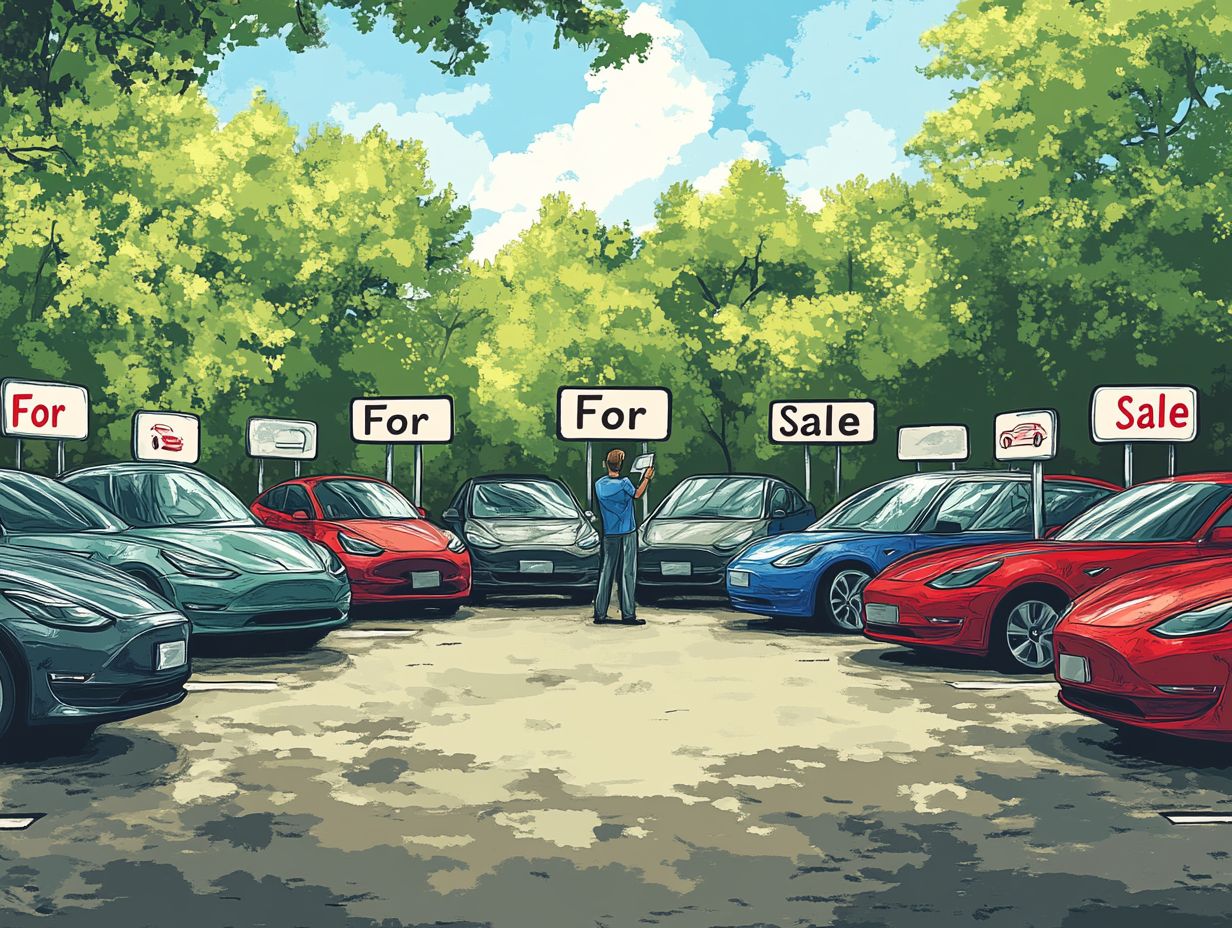
There are several options for reselling your EV, including selling it privately, trading it in at a dealership, selling it to a third-party reseller, or participating in a buyback program offered by the manufacturer. For those considering financing, it’s helpful to explore a quick guide to EV financing options.
Each option has its own benefits and drawbacks. It s important to research and compare before making a decision.
3. What factors should I consider when choosing a resale option?
When choosing a resale option, consider factors such as convenience, speed of sale, potential profits, and the condition of your EV, as well as how to evaluate EV resale value.
If you need to sell your EV quickly, trading it in at a dealership may be the best option, even if it means receiving a lower price. On the other hand, if you have time to sell privately, you may be able to get a higher price, but it may take longer.
4. How can I ensure I get the best price for my EV?
To get the best price for your EV, ensure it is in good condition and has been well-maintained. Research the current market value for your specific make and model to have realistic expectations for your sale.
Consider marketing your EV to a niche audience, such as EV enthusiasts, for a potentially higher price.
5. Are there any tax implications for reselling my EV?
Yes, there may be tax implications when reselling your EV. For example, if you sell it for more than you originally paid, you may need to report the profit as capital gains on your taxes.
It s important to consult with a tax professional to understand the specific implications for your situation.
6. Can I lease an EV and still have resale options?
Yes, you can lease an EV and still have resale options. However, since you do not own the vehicle, you will need to follow the terms and conditions of your lease agreement when reselling the EV.
This may include restrictions on modifications, mileage, and buyout options. Be sure to review your lease agreement carefully before considering any resale options.
Don’t miss out on the opportunity to maximize your profit and help the planet!

